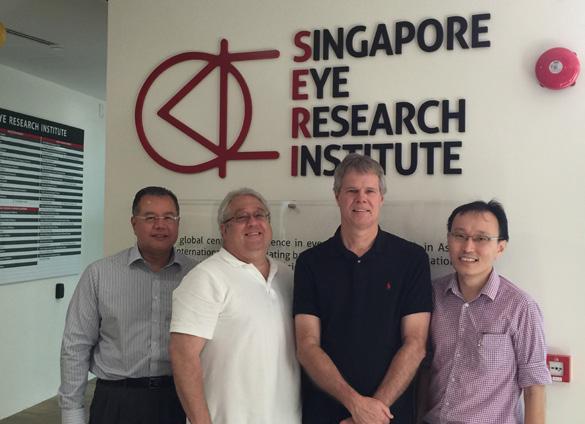
3 minute read
First Genetic Association of Increased Risk of Glaucoma in African Ancestry Populations
First Genetic Association of Increased Risk of Glaucoma in African Ancestry Populations P rimary Open Angle Glaucoma (POAG) is the most common form of glaucoma and the leading cause of irreversible blindness worldwide. It is well known that populations of African ancestry have the highest prevalence and severity of POAG, often leading to blindness early in life. Studies of POAG have primarily focused on European and Asian populations, while African populations have been understudied and under-represented in genomic research. A genome-wide association study that included 26,295 participants—believed to be the world’s largest dataset of people of African ancestry with glaucoma—found that genetic variation among the beta-amyloid producing gene is strongly associated with increased risk of POAG in people with African “African populations hold a treasure trove of unexplored genomic information. These findings could help change the way researchers perceive glaucoma and other diseases and may provide solutions to combat disease.” Michael Hauser, PhD Professor of Medicine
ancestry. This high risk genetic variant is common in around 20 percent of African populations but essentially absent in all other ancestral groups, according to findings published in the November 2019 issue of the Journal of the American Medical Association (JAMA). Researchers have long speculated that glaucoma and Alzheimer’s disease (AD) may share common features. This study provides the first genetic evidence that beta-amyloid deposits were increased in eye and brain tissues of African ancestry patients with POAG compared to unaffected individuals. The findings indicate that it may contribute to neuronal cell death in both diseases. These results are just the beginning of many expected valuable findings. “African populations hold a treasure trove of unexplored genomic information. These findings could help change the way researchers perceive glaucoma and other diseases and may provide solutions to combat disease,” said Michael Hauser, PhD, professor of medicine in the section of medical genetics, the study’s senior author. The research to investigate the association of glaucoma among people with African ancestry was initiated more than 20 years ago by the late R. Rand Allingham, MD, Barkhouser Professor of Ophthalmology Emeritus and former chief of glaucoma, along with Hauser, his long-time colleague and friend. They traveled around the world, developing partnerships with clinicians in Ghana, Nigeria, South Africa, and The Gambia to collect blood samples from glaucoma patients. “Allingham was determined to unravel the genetic basis for glaucoma and dedicated much of his career to this work. While it’s wonderful to have this publication to support our hard work, it’s unfortunate that he is not here to celebrate with us,” Hauser says. These significant findings support the need to better understand the association of African ancestry and disease. “I am happy to have played a small role in this study, but elated that Dr. Allingham’s tireless efforts in many African countries are finally being recognized. This paper represents the acknowledgement of his life’s work,” says Leon W. Herndon, Jr., MD, professor of ophthalmology and chief of the glaucoma division. Continued investigation of African ancestry and eye disease is being extended through a National Institutes of Health grant from the Human Heredity and Health in Africa (H3Africa) program. “Eyes of Africa: the Genetics of Blindness” funds the collection and analysis of samples in Nigeria, The Gambia, Malawi, and South Africa. This research was a joint effort involving Duke University, The Kathleen Price Bryan Brain Bank, the Alzheimer’s Disease Research Center, the Genome Institute of Singapore (GIS), the Singapore National Eye Center (SNEC), Singapore Eye Research Institute (SERI), partner institutions (including the University of California San Diego and the University of California San Francisco), and other leading eye centers around the world. Researchers responsible for identifying the genetic variation among the beta-amyloid producing gene that is strongly associated with increased risk of POAG in people with African ancestry. From left: Tin Aung, PhD, Michael Hauser, PhD, the late R. Rand Allingham, MD, and C. C. Khor, PhD.











